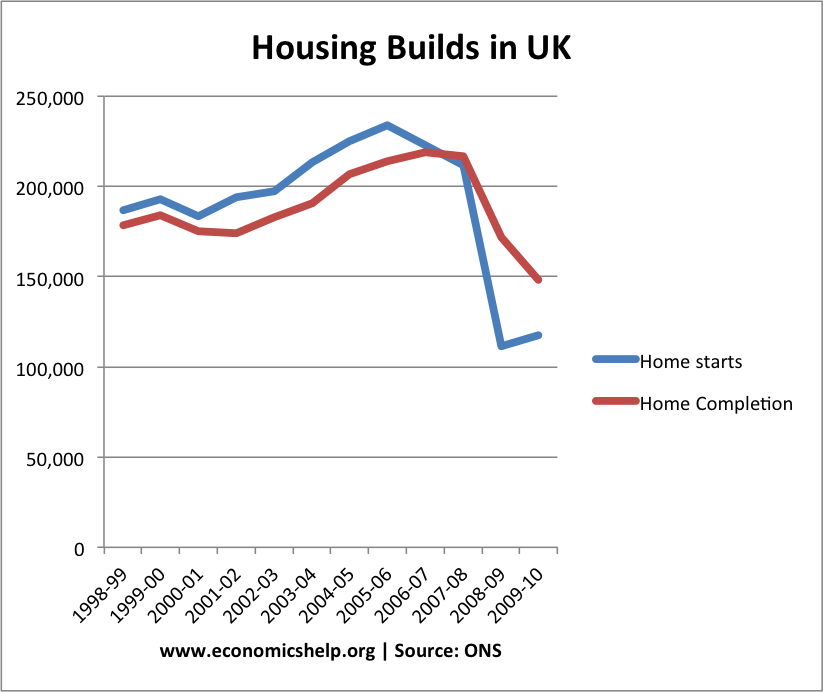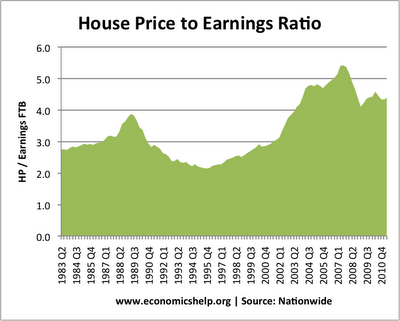A feature of the UK housing market is the low quantity of new houses built compared to the long term growth in demand.
Despite high house prices, firms are unable / unwilling to build as many as market forces dictate. The supply of housing is price inelastic.
The lack of supply has meant that the UK has seen a decline in affordability of housing; as a consequence, it is difficult for young people to buy a house and get on the property ladder. Housing is another factor causing increased inequality in the UK.
Reasons to Build more Houses.
Supply is growing less than expected demand. The number of new households is expected to grow by 200,000 – 250,000 a year. Yet, supply has been averaging less than 150,000 in recent years. This leaves a shortfall of housing stock, putting upward pressure on both house prices and cost of rent.
 Even at the end of the boom years, house builds were struggling to meet the target of 250,000 a year.
Even at the end of the boom years, house builds were struggling to meet the target of 250,000 a year.
- The number of households in England is projected to rise by 5.8 million from 2008 to 2033, an increase of 232,000 per year on average reaching 27.5 million in 2033. (Communities.gov.uk)
The number of new houses built in the UK in 2010/11 was only 106,000. This is partly a reflection of the economic outlook, but it also raises long term questions over sustainability of supply.
2. Decline in Affordability
The credit crunch and recession has seen a small fall in house prices, and a small improvement in affordability. But, house price to income ratios for first time buyers are still twice as much (4.4) as they were in the mid 1990s (2.1). This shows that despite the recession, house prices are much higher than they would be – if we had more homes built.

House price to earnings ratio

Despite ultra low base rates, mortgage payments still take over 30% of disposable income.
In other countries, like the US, Spain and Ireland, house prices have fallen more since the credit crunch.
3. Economic Benefits of more flexible labour market.
High house prices make it more difficult to move, especially to areas like London where prices are above the national average. A shortage of housing also pushes up rents. High house prices can increase geographical immobilities and lead to labour shortages in areas where there are housing shortages. Increasing supply of housing would help the labour market function more effectively.
4. Less volatile house prices.
UK house prices are volatile. This is partly a consequence of having an inelastic supply curve. If supply could increase due to relaxed planning restrictions, prices should be less volatile leading to less macroeconomic complications (e.g. inflation from Lawson boom of 1980s) Recession in early 1990s.
5. Increased Number of Households.
The number of households in UK is predicted to rise because:
- growing population
- net migration
- social changes, e.g. higher divorce rate
- more old single people living alone.
Interestingly the Barker report published in 2004, stated that the UK would need to build an extra 120,000 houses a year to bring the long term real house price increase down to 1.1%. Since that report has been published no effective action has been taken to make housing more affordable.
6. Intergenerational inequality.
If we don’t build houses, we will continue to see long term increases in house prices which benefit existing home owners, but at the expense of younger people who have to spend more on renting / mortgage payments.
7. Brown field sites.
Houses don’t have to be built on greenbelt land. There is scope for converting ‘brown field’ sites unusued urban areas into housing. The government could also encourage higher density housing (avoiding mistakes of 1960s tower blocks)
Arguments Against Buidling More Houses.
It is telling that since the Barker report of 2004 (and there have been other reports) recommending greater house building, the UK finds it difficult to agree on anywhere to build them. Proposed building sites are often opposed on a local level.
Local residents and councils fear building new houses will
- damage the environment; loss of greenbelt land
- increase road congestion
- increase pressure on local social services
Alternatives to Building More Houses. Make better use of existing housing stock. The number of vacant dwellings is very high.The government could place higher tax on vacant dwellings increasing incentive for supply of unused houses.
Conclusion
You could argue the issue of house building in the UK, is a classic example of ‘good idea, but not in my back yard’.
Generally, people see the importance of affordable housing. It makes sense to build more houses. However, there is a also a strong reluctance to see more of the countryside turned into housing estates. It is a difficult balancing act between increasing supply of housing without causing too many negative externalities.

There is a big difference between the services offered by traditional property management firms, who is the customer the real owner of the property. and professional hospitality management companies who specialize in corporate housing.